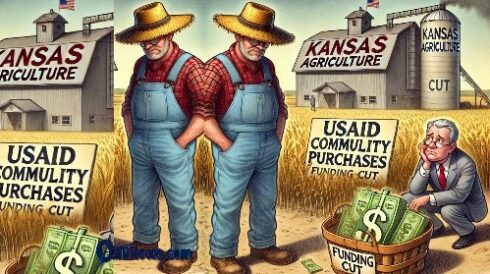The Trump administration’s recent suspension of USAID operations has left Kansas farmers bracing for economic uncertainty. For years, USAID has been a major buyer of U.S. agricultural products, purchasing approximately $2 billion worth of commodities in 2024 alone. Crops such as wheat, lentils, peas, and rice have been crucial to the agency’s international food aid programs, providing a stable market for American farmers.
With this abrupt halt in operations, food purchases for foreign aid programs have been frozen. While some waivers were granted to continue food assistance, they have done little to mitigate the widespread impact. Kansas farmers in particular, now face significant disruptions to their primary revenue streams, as USAID was a key purchaser of their produce.
The Role of USAID in Supporting Kansas Farmers And Across The U.S.
For decades, USAID has served as a vital bridge between American agricultural production and global food aid distribution. Kansas farmers, known for their production of wheat and sorghum, have benefited immensely from the agency’s consistent demand.
Through structured purchasing agreements, USAID provided not only financial stability but also guaranteed buyers in an unpredictable global market.
Now, with this safety net removed, Kansas farmers must seek alternative buyers or face severe financial repercussions. Market experts warn that the loss of this stable revenue stream could exacerbate an already challenging agricultural economy, characterized by fluctuating commodity prices and lingering trade uncertainties.
Kansas Farmers and Organizations Sound the Alarm
The Kansas Farmers Union has voiced strong concerns over the decision, warning that the suspension of USAID’s food aid programs could eliminate an entire market for local farmers. “Crops like wheat and sorghum, which were destined for food-insecure regions worldwide, are now left without a buyer,” stated a representative from the union. “This is an economic hit that many of our farmers simply cannot afford.”
The repercussions extend beyond just farmers. Reports indicate that at least 52,000 jobs in the U.S., including those in food processing and logistics, could be lost as a result of this suspension. Contractors supplying USAID programs have already accrued approximately $350 million in unpaid bills since the freeze took effect.
Stalled Aid Shipments and Global Consequences
Beyond Kansas, the suspension has left hundreds of millions of dollars’ worth of food and medicine stranded at ports, unable to be distributed due to bureaucratic confusion. The Associated Press has reported that shipments of American-grown wheat, soybeans, and other crops are currently stuck in limbo, with no clear timeline for their release.
The global ramifications of this suspension are dire. Many foreign aid programs rely heavily on USAID shipments to combat hunger and malnutrition in impoverished regions. Without these shipments, millions could face worsening food insecurity, deepening humanitarian crises in vulnerable areas worldwide.
Political Fallout and Future Uncertainty
Kansas Republican Senator Jerry Moran has been among those raising alarms about the perishable American-grown food now sitting idle. Critics of the decision argue that it was executed hastily, with little regard for the economic and humanitarian consequences.
While supporters of the move claim it is part of broader efforts to reevaluate foreign aid spending, the backlash from farmers and food aid organizations continues to mount. Industry analysts predict that unless an alternative program is swiftly introduced, Kansas farmers and their counterparts across the nation will struggle to recover from the financial strain imposed by the loss of USAID purchases.
As the situation unfolds, Kansas farmers are left grappling with uncertainty, hoping for swift policy reversals or new trade agreements that could offset the damage inflicted by the sudden halt in USAID operations.














